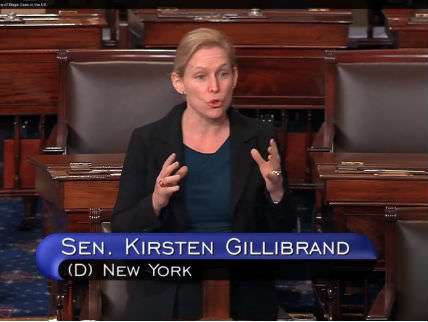Sen. Gillibrand on Gun Control: Ineffectiveness + Redundancy = Synergy

The New York Times reports that supporters of new gun controls are quietly regrouping after this month's Senate defeat. Their task, according to an unnamed participant in a meeting between Vice President Joe Biden and gun control activists, is "demonstrating that it's safe to do the right thing and politically unsafe not to." Judging from recent poll results, that could be a tall order. But it should be easier than demonstrating that "the right thing to do" is good policy, the difficulty of which is illustrated by a leading advocate of building bipartisan support for a legislative response to the Sandy Hook massacre.
"Let's be honest," says Sen. Kirsten Gillibrand (D-N.Y.). "Criminals aren't going to buy a gun and go through a background check." She nevertheless backs legislation expanding background checks for gun buyers. But since that bill will not impede criminals, the Times reports, Gillibrand also favors legislation that would "criminalize the shipping or transfer of guns to someone who is barred from possessing a firearm." That seems a bit redundant, since transferring a gun to someone you know or have reasonable cause to believe falls into a prohibited category is already a felony, punishable by up to 10 years in prison. Apparently Gillibrand wants to make it even more illegal, which she says is "complementary to background checks." There you have the theory underlying the gun controls favored by President Obama in a nutshell: None of these measures on its own will do anything to reduce crime, but if we pass them all together…well, they still won't do anything, but they will create the appearance of doing something.
Gillibrand's candor regarding the ineffectiveness of the background checks she supports reminds me of a remark that Norman Seabrook, president of the Correction Officers Benevolent Association, made about New York's new seven-round limit on magazines. "As a law enforcement officer for over 20 years," Seabrook said in January, "I understand the importance of instituting a new policy on mandating the limits of bullets that a regular citizen can possess, but as a matter of fact the bad guys are not going to follow this law." Seabrook's concern was not so much that the magazine limit would have no impact on crime but that New York's legislators, in their haste to enact the gun controls demanded by Gov. Andrew Cuomo, had neglected to exempt retired and active-duty cops from the seven-round rule. Since criminals sure as hell were not going to follow that rule, Seabrook worried that he and other members of the law enforcement fraternity would be outgunned. What about the "regular citizen"? Screw the regular citizen. What has he ever done for Norman Seabrook?
Gillibrand likewise is completely unconcerned about the burden and legal risks that extending background checks to private sales would impose on law-abiding gun owners, who by her own admission are the only people who will worry about following the new rules. Her attitude is: Why not respond to the Newtown murders with a piece of symbolic legislation that could not possibly have prevented them and that will not reduce other kinds of gun violence either? What's the downside?
